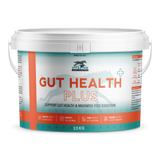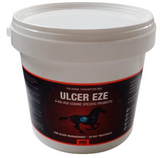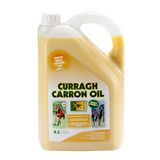Your Cart is empty
What is Colic in Horses?
Colic is the leading cause of medical fatalities in horses. The term colic is a very broad term and refers to “a pain in the horse's abdomen”. This pain may be caused by many different root issues.
Equine colic can be a simple blockage, caused by compacting of feed, just like constipation in humans when not enough fluid is consumed and a feed combination which tends to compact. This cause of colic is normally quite easily treatable. Compaction can also be caused by the consumption of sand, resulting in sand colic. Psyllium husk is a well-known and widely used product for the treatment of sand colic.
To follow are some symptoms of colic, please remember to seek immediate veterinary advice if you suspect your horse has colic, as this can be and often is a fatal condition and secret is getting veterinary intervention quickly.
How to identify if your horse has colic?
One of the most difficult things for the horse owner is trying to identify the signs of colic because there are just so many signs and they vary so much. The signs differ between individual horses and vary according to the severity of the pain.
Here are a few signs:
- bending their neck and head towards their flank
- repeated pawing at the ground
- biting their abdomen
- kicking out
- trying to urinate and not being able to in that stretching motion
- rolling violently
- lack of appetite
- continuous lying down and standing back up
- lowering head to drink water but not actually drinking
- bloating
- change in the look of the manure
- sweating more than normal
- breathing rapidly
- elevated heart rate
- becoming very quiet and lethargic

As a horse owner, we recommend that you get used to using a stethoscope, learning to check your horse's heart & respiration rate and hear the gastric sounds, this can be a useful tool so that you can identify if changes happen due to colic.
Types of colic found in horses:
|
Gas Sometimes excessive gas is formed by over fermentation of feed in the hind-gut, this can build up in the digestive tract and cause inflammation, pain, and discomfort for your horse. |
Intussusception Tapeworms or other parasites can often be the cause of this, where the intestine telescopes inside itself causing an obstruction, this can lead to the blood supply being cut off.
|
| Spasmodic ColicSpasms in the digestive system are caused by cramps, this can cause a lot of pain. |
Strangulation/torsion This is the most dangerous form of equine colic and is often fatal. This is when a twist occurs in the colon or intestine, which can lead to the blood supply being cut off and tissue dying.
|
|
Impaction Colic About 10% of colic cases are impaction. This happens where partially digested feed, like roughage, builds up in the intestine and then stops moving. The result of this is a blockage, or what we also call an impaction. |
Horses that live in sandy areas will often eat sand because the pick it up with their feed, this sand settles and hardens in the digestive tract. This can be moved with the feeding of psyllium husk.
|
| Displacement/Entrapment ColicThis type of colic is not common, however, it happens when an area of the digestive system moves internally so that it is no longer in its normal location if this displaced section of the intestine cannot move back again to its original position it can become entrapped. This can become very serious as blood flow can be interfered with resulting in sections of the digestive system dying. | Gastric RuptureThis is quite rear, but a gastric rupture can happen in an impaction reaches the horse's stomach, this causes the horse's stomach to become larger, however, if an actual rupture occurs this is invariably fatal. |
How to treat colic in horses
- Call your vet immediately
- Take away food from your horse
- Try and take note of the symptoms, so that you can tell your vet.
- Keep your horse calm & comfortable
- Try and keep your horse walking slowly if it is comfortable to do so.
- Allow your horse to lie down if they appear to be resting.
- Do not administer any drugs.
- Follow your vet's advice.
Diagnose the cause of colic
The first thing your veterinarian will do is try to assess the severity of the colic and will work on identifying the cause of the colic. A series of procedures and tests will be performed in order to establish the root cause and how best to treat it.
This may result in minor treatment to major surgery - depending on your vet’s findings.
5 Horse Products to assist in preventing colic
Sand Clear Plus contains Psyllium husk, Kaolin & Linseed oil, which is a great help in moving compacted sand out of the digestive tract. If you live in sandy areas, it’s likely that your horse is ingesting a certain amount of sand, we suggest adding the Sand Clear Plus for just 1 week per month, just to move that sand along so it does not settle for too long.
Gut Health Plus works to keep the digestive bacteria level right in the hindgut, it contains pre-biotics, anti-acids, and many other ingredients to actively keep the digestive system healthy. A healthy good bacteria population helps to effectively break down and digest the feed. Feeding Gut Health Plus continuously will keep the digestive system healthy.

Wormers are an important tool to get rid of parasites and worms which could affect the integrity of the intestinal wall. When used correctly? read more about worming. Having a healthy & strong intestinal wall is beneficial to reduce the possibility of a rupture.
Ulcereze is an equine specific probiotic, which is the beneficial live bacteria needed in the digestive system to better digest the feed. We recommend you just feed this for 1 week, every second month, to boost the bacterial population.

Curragh Carron Oil is a linseed oil with pH acid balancer. This product is very beneficial for reducing acid and keeping the feed moving through the system.
Aftercare
It is not possible to avoid every case or colic, however careful management can play a role in preventing equine colic. Here are a few suggestions which can reduce your risk of colic.
- Make sure your daily routine always includes feeding and exercise, a horse needs exercise to maintain a healthy digestive system and keep things moving through.
- Feed a good quality feed containing a lot of roughage, when using hay make sure the quality is good and the hay is clean and free of fungal spores and bacteria. You can do this by steaming your hay.
- Try avoid feeding too much grain or concentrated feeds, always add chaff to hard feeds.
- If possible add a linseed feeding oil to the feed, this has a lubricating effect within the digestive system.
- Feed little and often. Instead of just 2 feeds per day, try and divide the feed into 4 feeds per day. Hay should be available all day, preferable from a slow feeder device so that your horse does not eat too much at one time.
- Do an FEC (Fecal egg count) every 12 months, to ensure you are using the correct wormer to control parasites.
- Do not confine to a stable box, turnout is important.
- Make sure fresh water is readily available at all times and monitor how much water your horse is drinking, sometimes on cooler days your horse consumption may drop significantly, this could be a problem for digestion and could lead to compaction. During colder periods when your horse's consumption of water reduces you might want to put a salt lick in their stable or add salt to their feed as these help induce water drinking.
- Try not to use medications unless ordered by your veterinary.
- Avoid putting feed directly on the ground, especially in sandy areas, and if you live in a sandy area, treat your horse for 1 week every month for Sandxpell.
- If you ever change your horse's diet or start using a supplement, always make these changes gradually.
At Amacron Equine we are here to help, call us on 1300 791 653





